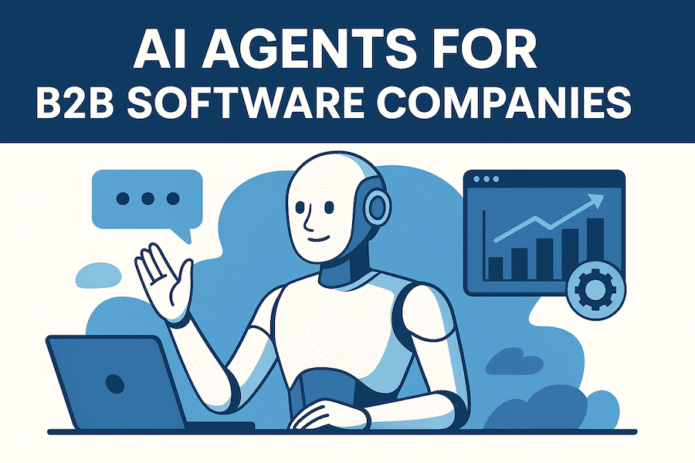In the fast-paced landscape of B2B software, companies continually strive to gain a competitive edge by enhancing customer experience, streamlining operations, and accelerating growth. One of the most promising avenues for achieving these goals is through the adoption of AI agents. AI agents, powered by advanced artificial intelligence technologies, autonomously perform tasks, make decisions, and interact naturally with users, drastically transforming the way B2B software companies operate and deliver value.
Why B2B Software Companies Should Embrace AI Agents
1. Enhanced Customer Experience
AI agents can provide instant, personalized responses to customer queries, significantly improving customer satisfaction and retention rates. Unlike traditional support channels, AI agents are available around the clock, providing immediate assistance and minimizing wait times.
2. Operational Efficiency
AI agents automate routine and repetitive tasks, freeing up human resources to focus on complex, strategic initiatives. This not only reduces operational costs but also enhances productivity and innovation across teams.
3. Increased Scalability
AI-driven automation allows companies to scale effortlessly. AI agents manage increasing volumes of customer interactions without compromising the quality of service, enabling software companies to expand rapidly without proportional increases in workforce or infrastructure costs.
4. Data-Driven Decision Making
AI agents collect and analyze vast amounts of user data, providing actionable insights that help businesses make informed, strategic decisions. Predictive analytics capabilities enable companies to anticipate market trends, customer preferences, and potential risks.
5. Competitive Advantage
Companies adopting AI agents early position themselves as industry leaders, attracting tech-savvy clients and setting benchmarks in customer support, efficiency, and innovation.
How to Implement AI Agents Effectively
1. Define Clear Objectives
Establish specific goals and KPIs for your AI agents. Whether the aim is improving customer service, automating internal processes, or gaining strategic insights, clearly defined objectives ensure focused and effective implementation.
2. Select the Right Technology and Platform
Choose AI tools and platforms that align with your business objectives, infrastructure, and technical capabilities. Consider factors such as integration ease, scalability, customizability, and data security.
3. Ensure Seamless Integration
Integrate AI agents smoothly with existing workflows and systems. Avoid disrupting current operations by involving stakeholders early and conducting thorough testing in controlled environments before full-scale deployment.
4. Prioritize Data Privacy and Security
Implement rigorous security measures to protect customer data and comply with relevant regulations such as GDPR. Transparent communication with customers about data usage and protection builds trust and confidence.
5. Invest in Continuous Learning and Improvement
AI agents continuously learn from user interactions and feedback. Regularly review performance metrics and user feedback to optimize AI capabilities and ensure ongoing relevance and effectiveness.
Conclusion
By leveraging AI agents, B2B software companies can dramatically improve customer satisfaction, streamline operations, and secure a robust competitive advantage. Effective implementation involves strategic planning, careful technology selection, seamless integration, strict data security protocols, and continuous learning. Embracing AI agents now positions B2B software companies to thrive in an increasingly AI-driven business landscape.
